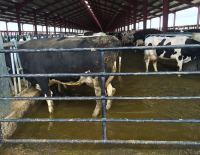Lawsuits will stop pollution from flowing into the Columbia and its tributaries.
Read or listen to our strategic priorities for this program now:
Our Goals
- Reduce toxic pollution so people can safely eat fish and other aquatic life in most locations on the Columbia River without toxic contamination
- Protect salmon and other fish and wildlife from toxic and other pollution
- Work with community members to advocate for clean drinking water
The Problem
Every person has the right to eat Columbia River fish and shellfish without fear of toxic pollutants. Today, this is not a reality. Thousands of pipes discharge pollution into the Columbia and its tributaries. This pollution includes metals and toxic substances that make parts of the Columbia unhealthy for fish and people. Pesticides and heavy metals enter the river from diffuse sources, such as agricultural runoff and air deposition. Pollution from former industrial sites also continues to leach into the river.
Toxic pollution accumulates to dangerous levels in the fish people eat—particularly resident fish like sturgeon and bass—and can cause cancer, birth defects, and serious illnesses. Studies demonstrate toxic pollution in Columbia River fish disproportionately impacts Native Americans and Asian/Pacific Islanders. Pollution also harms salmon and other aquatic life in the Columbia River. Studies on the Columbia River have documented that many toxic contaminants are moving up the food chain and accumulating in the bodies of animals that eat fish.
In addition to surface-water pollution, groundwater pollution in the Columbia River basin is well documented and often has disproportionate impacts on BIPOC communities. This includes the groundwater pollution from agriculture—including factory farms—that disproportionately harms Indigenous and People of Color in the Lower Umatilla Groundwater Management Area in Morrow and Umatilla counties.
Our Plan
Enforce the Law
We will initiate, and resolve on favorable terms, at least 12 Clean Water Act enforcement lawsuits against companies or public entities that violate the law. These lawsuits will stop pollution from flowing into the Columbia and its tributaries. The lawsuits will also hold polluters accountable by requiring that they pay a penalty, which will go to a foundation to support Tribes and nonprofits working to protect and restore the river.
Hold the Government Accountable
We will work in solidarity with Yakama Nation to secure Superfund listing for Bradford Island and surrounding waters, located near Bonneville Dam, and engage impacted communities in the cleanup process if listed. We will also work with river communities to engage in government decision making, or spur government action, on toxic cleanup sites, such as the Goldendale Aluminum and Georgia-Pacific Washougal sites.
Stand Up to Factory Farms
We will work with coalition partners and the Confederated Tribes of Umatilla Indian Reservation (CTUIR) to stop new or expanded mega-dairies in Oregon and advocate for reforms to reduce air and water pollution. As part of our coalition work, we will work with community members in Umatilla and Morrow counties to advocate for state and federal action to address groundwater contamination in the Lower Umatilla Groundwater Management Area.
Stand Up to Oil
We will watchdog the Global Partners terminal and stop expansion of oil-by-rail if a proposal arises. We will also defend the City of Portland’s decision rejecting oil operations at Zenith Energy and continue to engage in the regional Stand Up to Oil coalition.
Challenge Pollution Loopholes
We will engage in government decisionmaking processes to improve water pollution discharge permits, policies, and rulemakings to reduce pollution. We will also work in solidarity with Tribes to continue legal challenges to Trump administration laws that gutted public health and clean water protections.
Prefer to read PDF?



